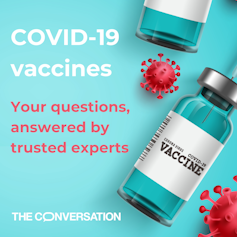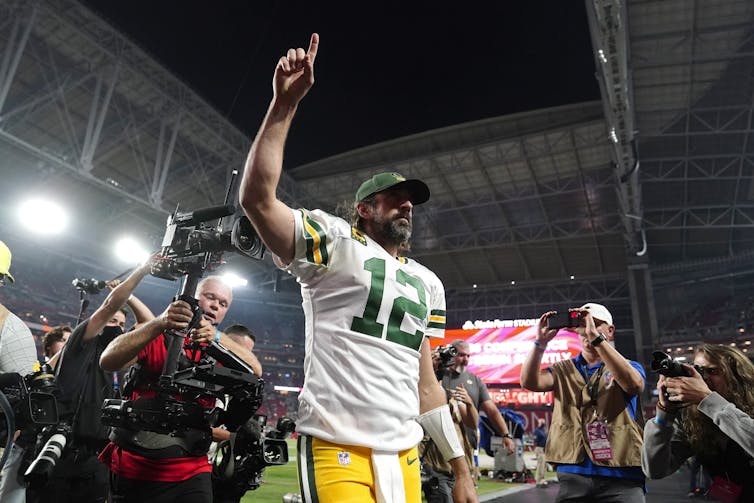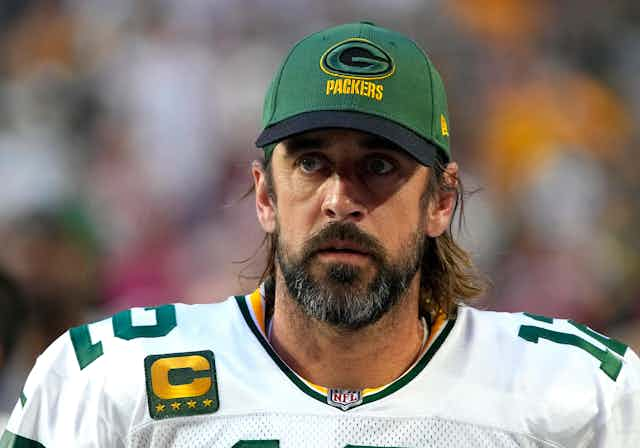They say never meet your heroes. Take football hero Aaron Rodgers. The Green Bay Packers quarterback is undeniably great at playing football. He has won Most Valuable Player of the National Football League (NFL) three times. His team won the Superbowl in 2011 and he holds numerous records.

But it’s what’s happening above the shoulder pads that has recently received attention: After insinuating that he was protected against COVID-19, it turns out that he never received a vaccine. And he has recently tested positive for COVID-19.
Celebrity platforms
As a doctor, I am not here to take pleasure in his misfortune or say, “We told you so,” even if getting vaccinated is exactly what medical experts have recommended as the best protection against COVID-19. I am not here to challenge Rodgers’ freedom of speech.
I am here to say that my colleagues and I are burned out by the pandemic’s effects on an already-broken system and that misinformation from Rodgers and others with a celebrity platform or a large following is harmful.
Misinformation emboldens those who believe falsehoods and has led to physical violence against doctors, death threats against public health officials and protesters blocking cancer patients from entering hospitals.
Since the scientific triumph of safe and effective vaccines against the SARS-CoV-2 virus I have had many discussions with patients. The ones that start with “I’m not an anti-vaxxer” inevitably lead to vaccine denial. Similarly, Rodgers defends his celebrity credibility as someone who is “not some sort of anti-vaxx flat Earther. I am somebody who’s a critical thinker” who “did his own research.”
Yet he has amplified dangerous and disproven myths about the COVID-19 vaccine.
Myth-busting Rodgers’ statements
Rodgers said that vaccines could impact fertility; there is neither proof nor plausibility to this statement.
He said he’s “allergic to an ingredient” in both the Pfizer and Moderna products, despite no mention of having these rare allergies confirmed by an allergist.
He said “we don’t know a whole lot about” the vaccine although after seven billion doses we know a lot. And so far the evidence is clear: the vaccine is effective against a virus that has killed over five million people globally and more than 750,000 in Rodgers’ America.

Rodgers also repeats other common unfounded anti-vaccine arguments in saying, “this idea that it’s the pandemic of the unvaccinated is just a total lie … If the vaccine is so great, then how come people are still getting COVID and spreading COVID?”
Studies show that unvaccinated people are more likely to get COVID-19. They’re more likely to spread COVID-19 (the research awaiting peer review). And are more likely to get really sick and die from COVID-19. The vaccine is not perfect, but it leads to better protection than “natural immunity.” Avoiding vaccination because some vaccinated people get sick is like saying that impaired driving laws are useless because some sober drivers still have car accidents.
Rodgers believes strongly in “bodily autonomy.” Others care about that too. Like people most at risk of COVID-19, such as those with cancer or autoimmune diseases that both increase their risk of infection while also diminishing their ability make antibodies after immunization. Know who else cares? Parents like me with young children who are not yet eligible to get the vaccine.
Rodgers also dogwhistles his followers in citing ivermectin and homeopathy. Ivermectin has not been shown in studies to improve COVID-19 outcomes and a rare publication that did show an effect was retracted because the authors fabricated trial participants that didn’t exist. Homeopathy has not proven better than placebo for any condition.
Further to his anti-science and anti-vaccine statements, Rodgers has shown anti-mask behaviour, appearing without facial covering indoors at work and in the community, endangering himself and others. The NFL fined Rodgers US$14,650, or 0.04 per cent of his US$33.5 million salary.
Science-informed celebrities
I get that vaccination is an emotional subject; if the battle were about facts then anti-vaccine sentiments would have been eradicated years ago like smallpox. Trust is vitally important. And for every Aaron Rodgers who is free to speak untruths, we need more science-informed celebrities like Ryan Reynolds, Mindy Kaling, Ariana Grande, Tyler Perry and Dolly Parton, who also helped fund Moderna vaccine research.
Historically, Elvis Presley, Sammy Davis Jr., Louis Armstrong and Ella Fitzgerald were critical in instilling trust in the government’s vaccine rollout when polio vaccine hesitancy was 50 per cent.
So when it comes to meeting your heroes, maybe it’s a good thing. Rather than supporting the view that they are untouchable stars up high, they remind us that we are all human and susceptible to viruses and viral misinformation alike.
Do you have a question about COVID-19 vaccines? Email us at ca-vaccination@theconversation.com and vaccine experts will answer questions in upcoming articles.

